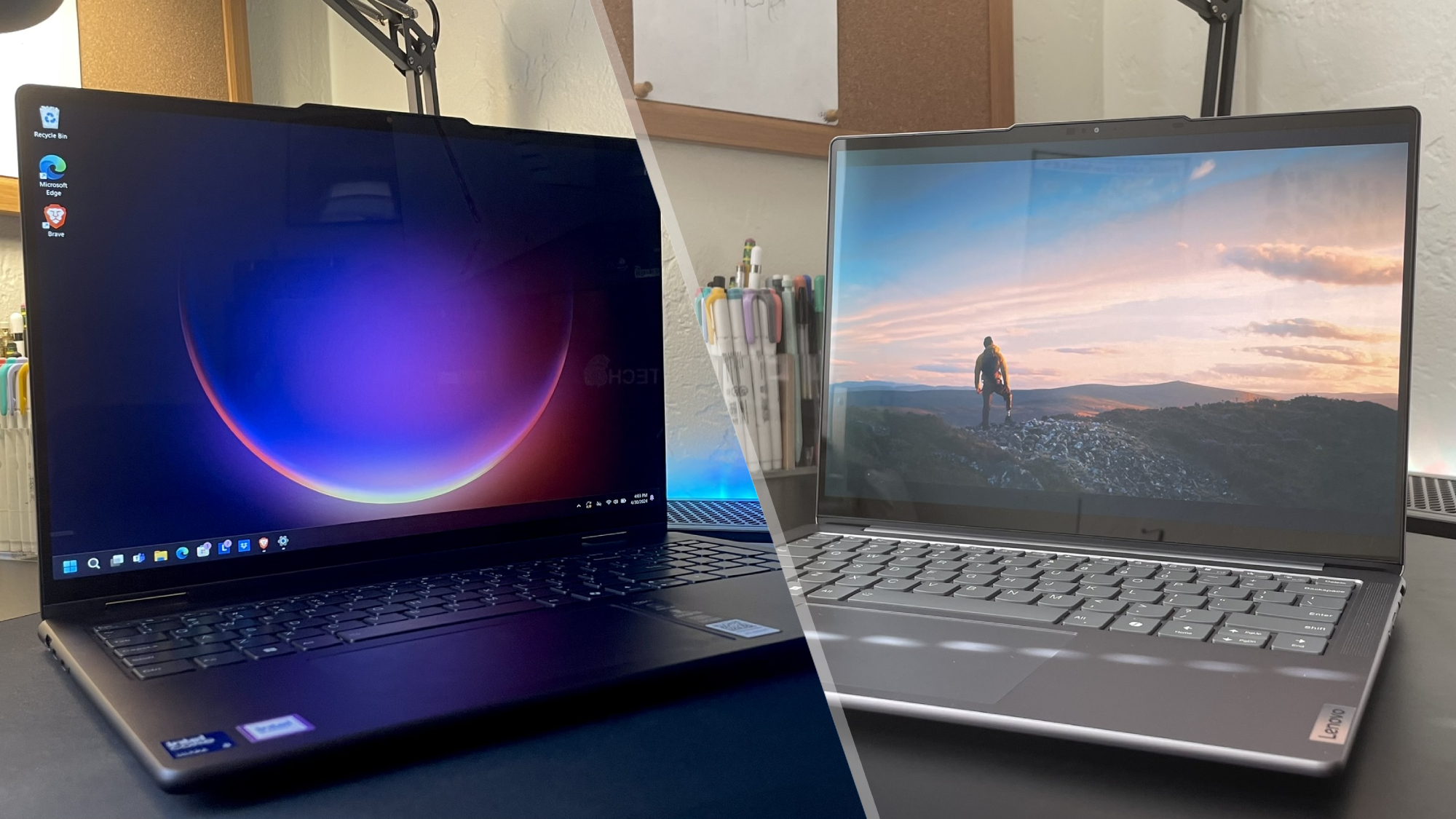
Lenovo has released Gen 9 editions of two of its popular laptops: The Lenovo Yoga 7i 2-in-1 and the Lenovo Slim 7i. Both devices have a similar retail price and steel gray aesthetic. While only the Yoga 7i can flip into tablet mode, both devices also have touch displays.
Despite those similarities, these two laptops performed differently in our testing and review process. So, there are a few things you need to know to make sure you pick the right one.
Here’s a comparison of the Lenovo Yoga 7i Gen 9 and Lenovo Slim 7i Gen 9, from display quality to performance.
Lenovo Yoga 7i vs Lenovo Slim 7i: Price and configurations
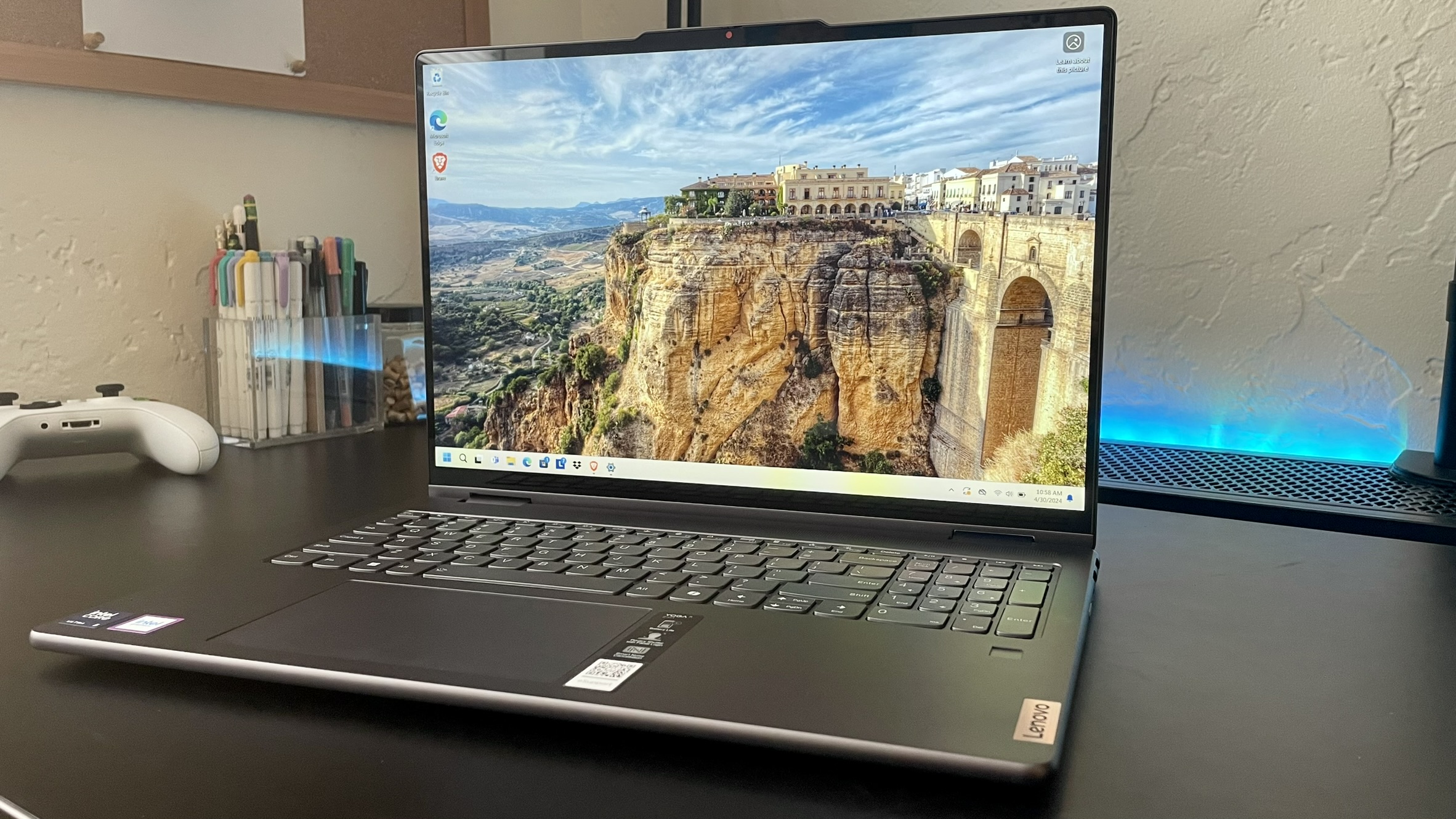
The Lenovo Yoga 7i Gen 9 and Slim 7i Gen 9 each have 14-inch models but only the Yoga 7i has a 16-inch model. Both have some customization options, though, and similar prices.
The Lenovo Slim 7i Gen 9 costs $1099 for a base configuration, including an Intel Core Ultra 5 125H CPU, 16GB of RAM, 1TB of storage, and Intel integrated graphics. Several upgrades are available, including an Intel Core Ultra 7 155H CPU, which allows you to upgrade RAM to 32GB (the Core Ultra 5 CPU only has the option for 16GB of RAM).
While the Lenovo Slim 7i Gen 9 is only available in a 14-inch model, the Yoga 7i Gen 9 has both 16-inch and 14-inch models. The 14-inch model costs just $809 for a base configuration with an Intel Core Ultra 5 125H CPU, 16GB of RAM, 512GB of storage, and Intel integrated graphics. Similarly, the 16-inch model (which we reviewed) starts at $909 for an Intel Core Ultra 5 125H CPU, 16GB of RAM, 512GB of storage, and Intel-integrated graphics.
Regardless of your Yoga 7i configuration size, you can upgrade to an Intel Core Ultra 7 155H CPU or increase your RAM to 1TB.
Winner: Lenovo Yoga 7i Gen 9 (more configuration options)
Lenovo Yoga 7i vs Lenovo Slim 7i: Design
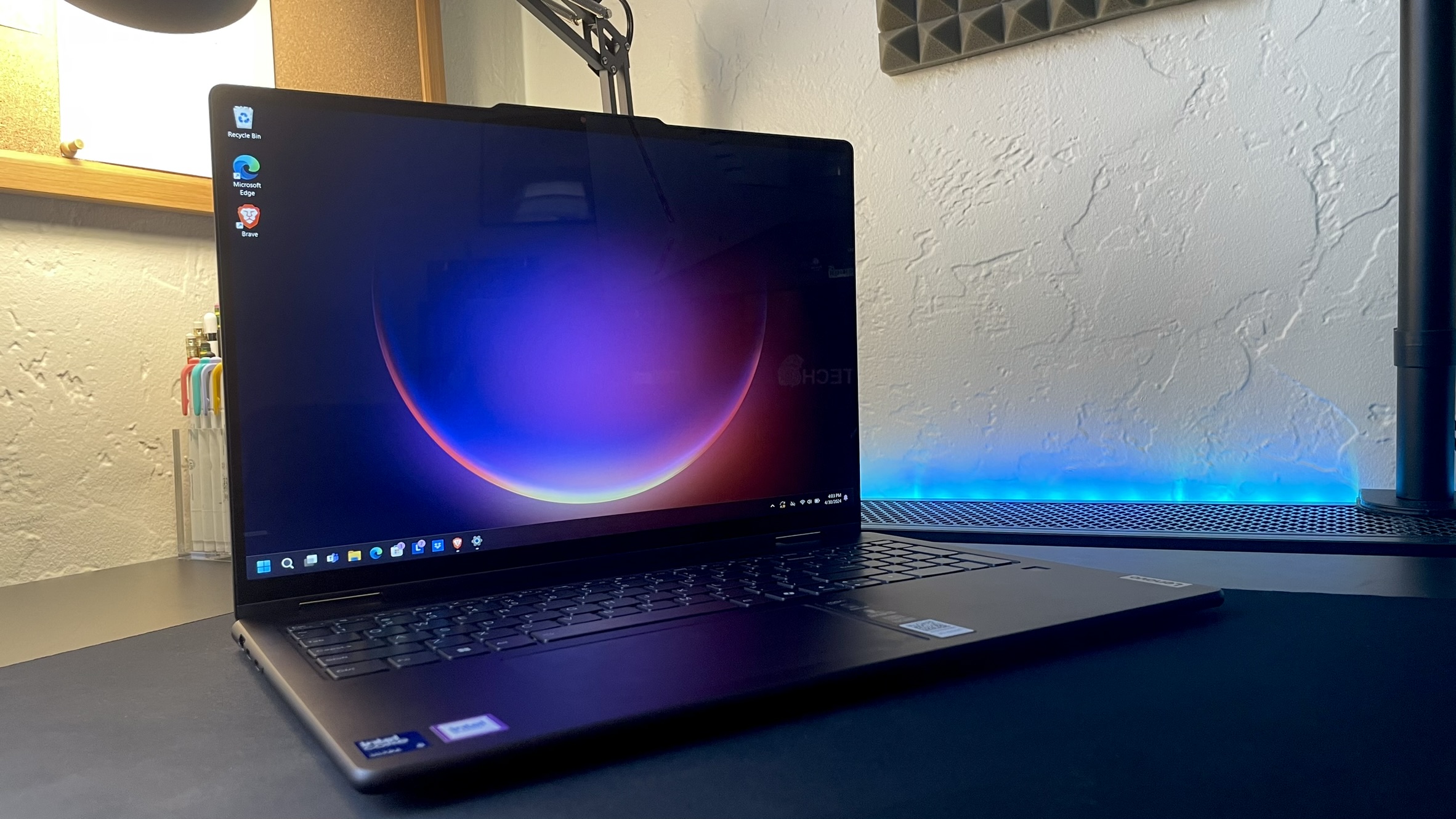
The Lenovo Yoga 7i and Slim 7i have very similar chassis designs with a few significant differences. The most obvious is that the Yoga 7i is a 2-in-1, so you can flip the screen around to use it in tablet mode. In contrast, the Slim 7i uses a conventional laptop form factor, although it does have a touch display.
Aside from the Yoga 7i being a 2-in-1, these two devices share a minimalistic steel gray chassis design. They each have a built-in webcam shutter, although the switch for the Slim 7i’s is on the right edge of the keyboard deck rather than integrated into the webcam bump. The Yoga 7i is also a slightly dark shade of metallic gray, but both colors look nice. Either device would fit in fine at school, work, or on the go.
Both devices have top-firing speakers, so you’ll get a great audio experience regardless of which way you go. If you spend a lot of time typing, you’ll probably want to opt for the Slim 7i. It features one of the most satisfying laptop keyboards I’ve ever tested, and this is coming from someone who builds and tests keyboards for a living. The Yoga 7i’s keyboard looks similar, but its layout and key travel result in an awkward typing experience, especially on the 16-inch model, where the number pad is too close to the main keys.
So, the better design mainly comes down to your individual needs, but the Yoga 7i Gen 9 has an edge thanks to its tablet mode. However, if you’re looking for the best typing experience, the Slim 7i should be at the top of your list.
Winner: Lenovo Yoga 7i Gen 9
Lenovo Yoga 7i vs Lenovo Slim 7i: Display
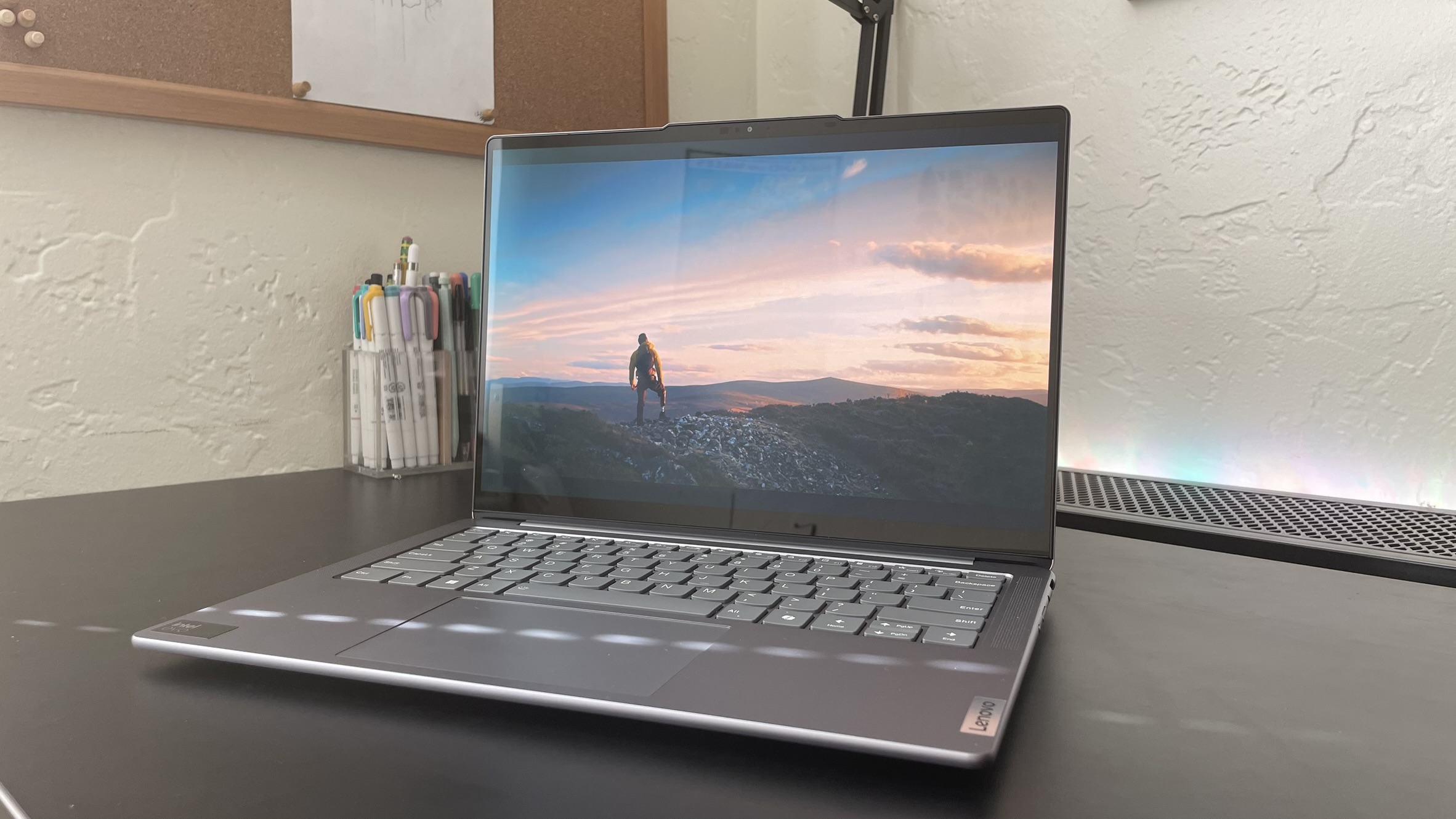
One of the most significant differences between the Lenovo Yoga 7i Gen 9 and the Slim 7i Gen 9 is their displays. While these two devices might look similar, they had dramatically different results on our display tests.
The Yoga 7i Gen 9 covered only 47% of the DCI-P3 color gamut, nearly three times less than the 134% covered by the Slim 7i. The Yoga 7i also has a noticeably dimmer display with a max brightness of 312 nits compared to the Slim 7i’s 382 nits.
Those results might not be surprising, considering the Slim 7i has an OLED display while the Yoga 7i has an IPS display. However, the color gamut test results, in particular, are significant enough to be a top consideration when choosing between these two devices.
Due to its 16-inch display, the Yoga 7i seems tempting at first for watching movies or streaming shows. However, the poor color gamut coverage gives everything on screen a dull, almost flat appearance, as if someone turned down the saturation. The display isn’t just duller on paper, either. I immediately noticed the difference when looking at the Yoga 7i and Slim 7i side-by-side.
So, if you want to use your mobile computing device for anything like watching movies, editing photos, or doing graphic design. In that case, the Lenovo Slim 7i is the way to go, despite having a smaller display. Unless the tablet functionality of the Yoga 7i is a dealbreaker for you, the Slim 7i’s superior display makes it far better suited to tasks requiring good visuals.
Winner: Lenovo Slim 7i Gen 9
Lenovo Yoga 7i vs Lenovo Slim 7i: Performance
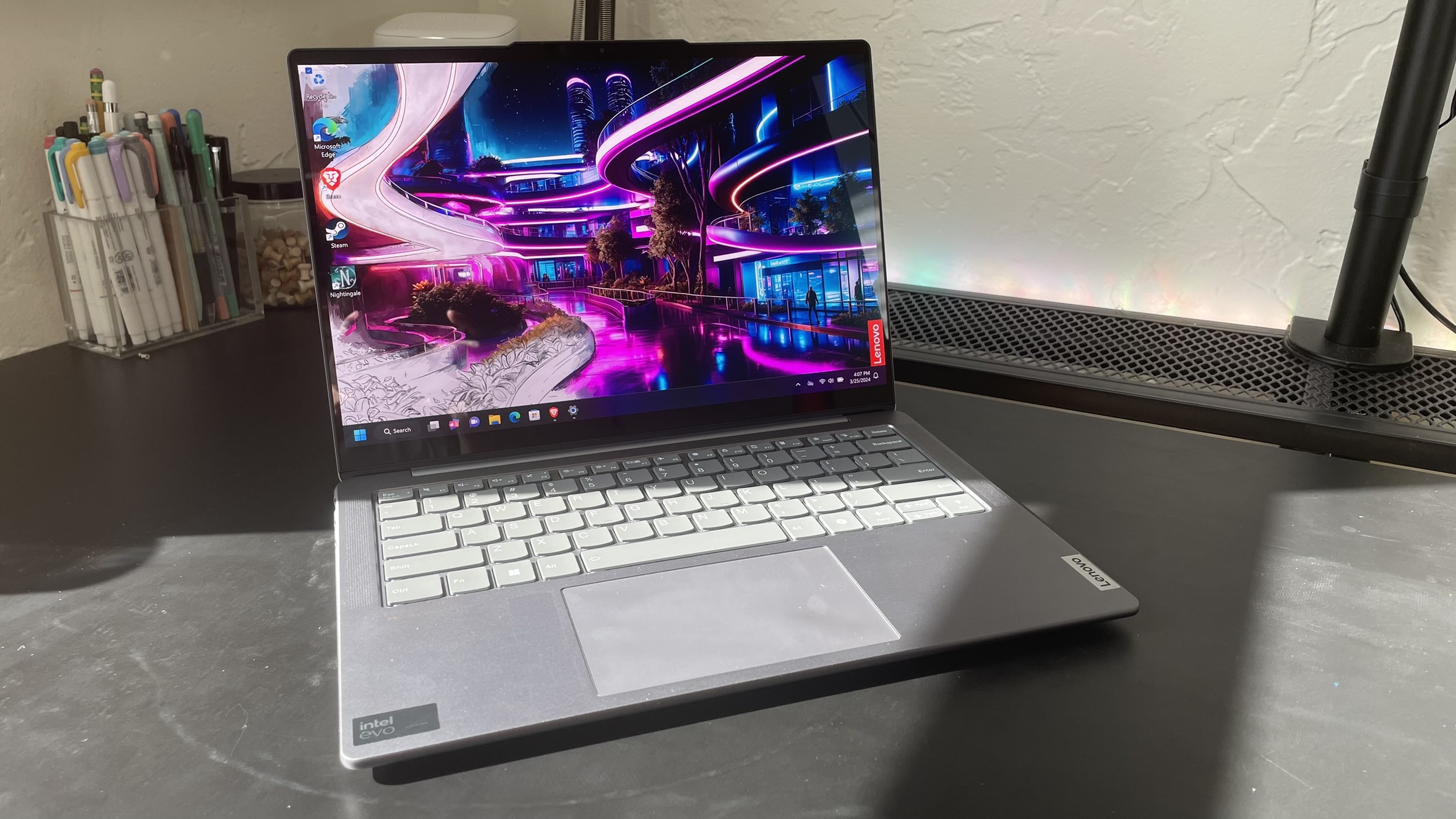
There was a big gap between the Lenovo Slim 7i and Yoga 7i in our performance tests, but it’s important to note that these two devices have different CPUs. The Lenovo Slim 7i we tested included an Intel Core Ultra 7 155H CPU, while our Yoga 7i had an Intel Core Ultra 5 125H CPU.
Both devices have the option for either of these CPUs, with the Core Ultra 5 125H included in the base models of either device and the Core Ultra 7 150H available as an upgrade. So, if you are split between the Lenovo Slim 7i and Yoga 7i, remember you can upgrade to a Core Ultra 7 CPU in either one. Our Slim 7i also had twice as much RAM as the Yoga 7i configuration we reviewed, impacting performance. At the time of writing, only the Slim 7i has an option for 32GB of RAM, while the Yoga 7i tops out at 16GB.
Those configuration differences significantly affected performance scores. The Lenovo Slim 7i scored 12,111 on Geekbench 6.1, over 2,000 points higher than the Yoga 7i’s score of 9,415. The Slim 7i also completed a 25GB file transfer faster, taking 17 minutes at a rate of 1,534 MBps. In comparison, the Yoga 7i copied the same file in 19 minutes at a rate of 1,368 MBps.
Upgrading the Yoga 7i to an Intel Core Ultra 7 CPU could help close the gap between those scores. However, the lack of an option for 32GB of RAM means the Slim 7i still has an edge in terms of max possible performance.
Winner: Lenovo Slim 7i Gen 9
Lenovo Yoga 7i vs Lenovo Slim 7i: Graphics
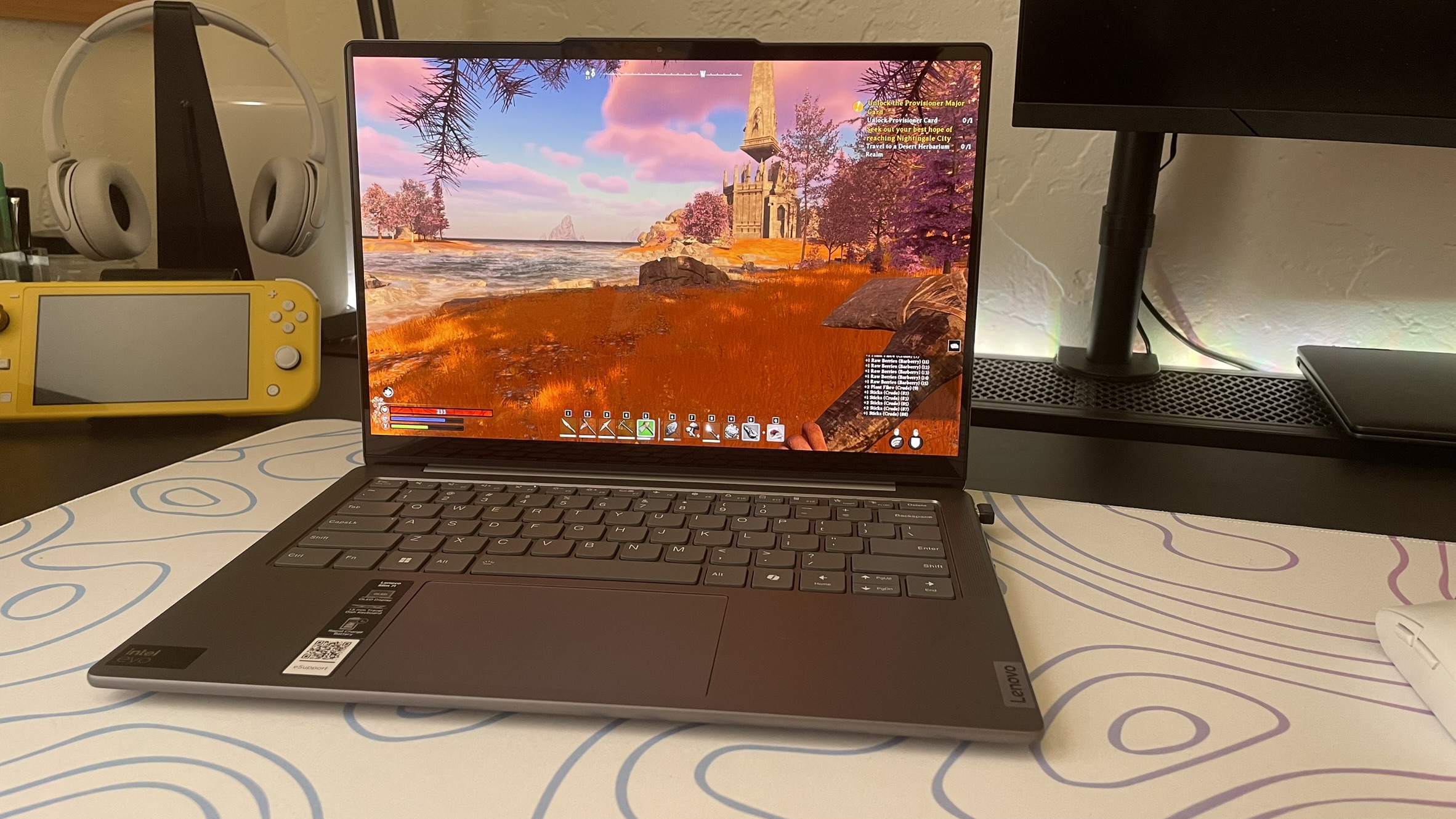
If you mainly want to use your laptop or 2-in-1 for gaming, you’ll want to head over to our guide to the best gaming laptops. The Lenovo Slim 7i and Yoga 7i have their uses, but neither is especially good at gaming. Both devices are limited to integrated graphics, meaning they can only run low-spec games.
Good graphics performance is also useful for other purposes, including photo and video editing and graphic design. The Lenovo Slim 7i and Yoga 7i are better suited to these tasks than graphics-intensive gaming, though they don’t perform on the same level.
On the 3DMark Fire Strike graphics test, the Slim 7i scored 8,455, while the Yoga 7i scored only 4,969. There was an even more glaring difference on our Sid Meier’s Civilization VI: Gathering Storm test. While running the game in 1080p, the Yoga 7i averaged 20 fps, less than half the Slim 7i’s average of 41 fps.
Those results show a clear gap between the Lenovo Slim 7i and Yoga 7i, even if you plan to game less. If you need to render graphics in Photoshop or edit in Premiere Pro, you’ll get faster, smoother performance on the Slim 7i Gen 9.
Winner: Lenovo Slim 7i Gen 9
Lenovo Yoga 7i vs Lenovo Slim 7i: Battery life
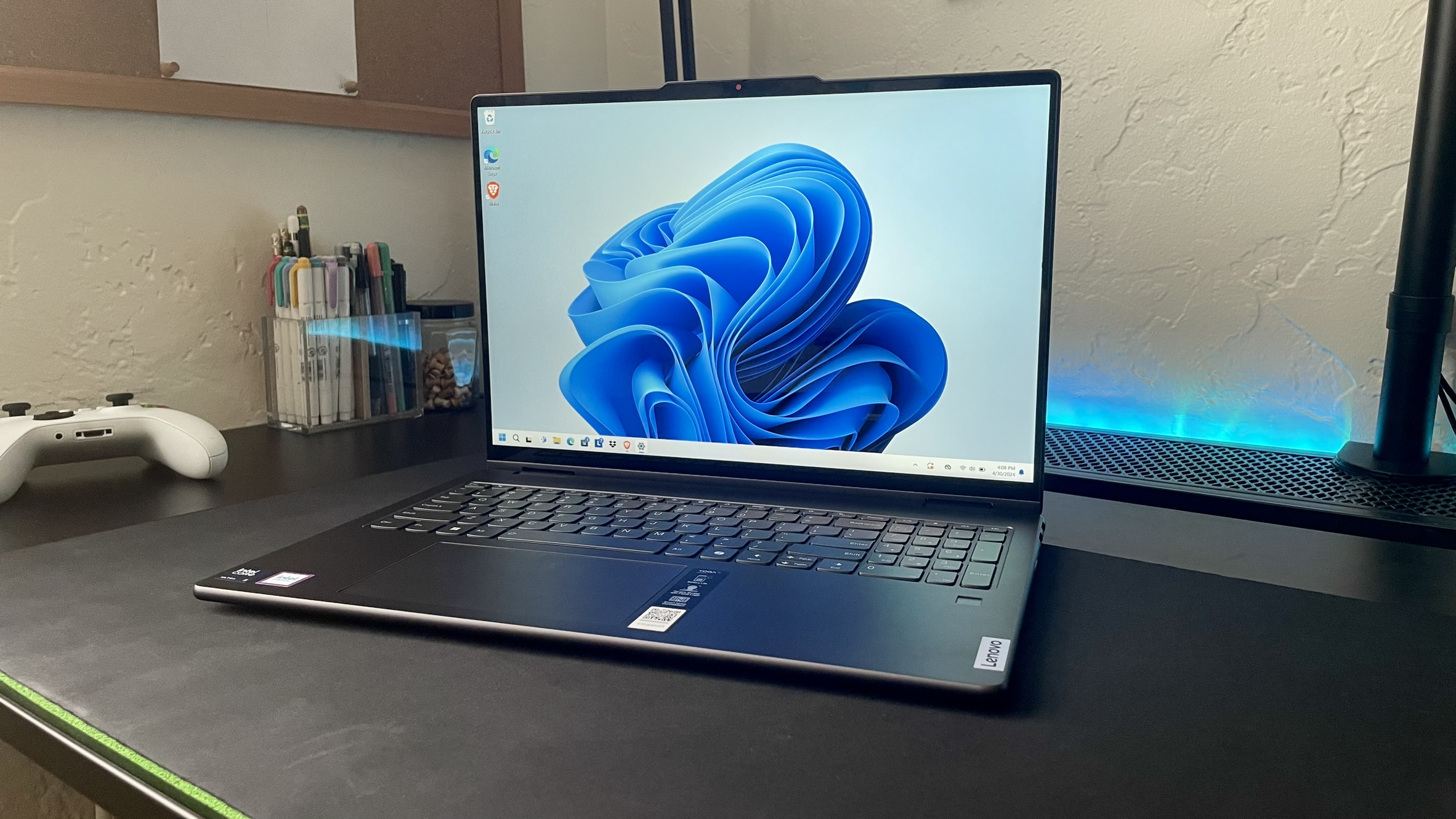
Battery life is one area where the Lenovo Yoga 7i Gen 9 excelled and even outscored the Slim 7i. On our battery test, it had an average battery life of 11 hours and 24 minutes, over an hour longer than the Slim 7i’s time of 10 hours and 3 minutes. The Yoga 7i also exceeded our premium laptop average of 10 hours and 7 minutes.
If battery life is your top priority, the Lenovo Yoga 7i is better. However, both laptops lasted a whole day during my review process. So, this category probably won’t be a deal breaker unless you are doing power-intensive tasks like video editing or gaming (which, ironically, the Slim 7i is better for despite having a lower battery life).
Winner: Lenovo Yoga 7i Gen 9
Overall winner: Lenovo Slim 7i Gen 9
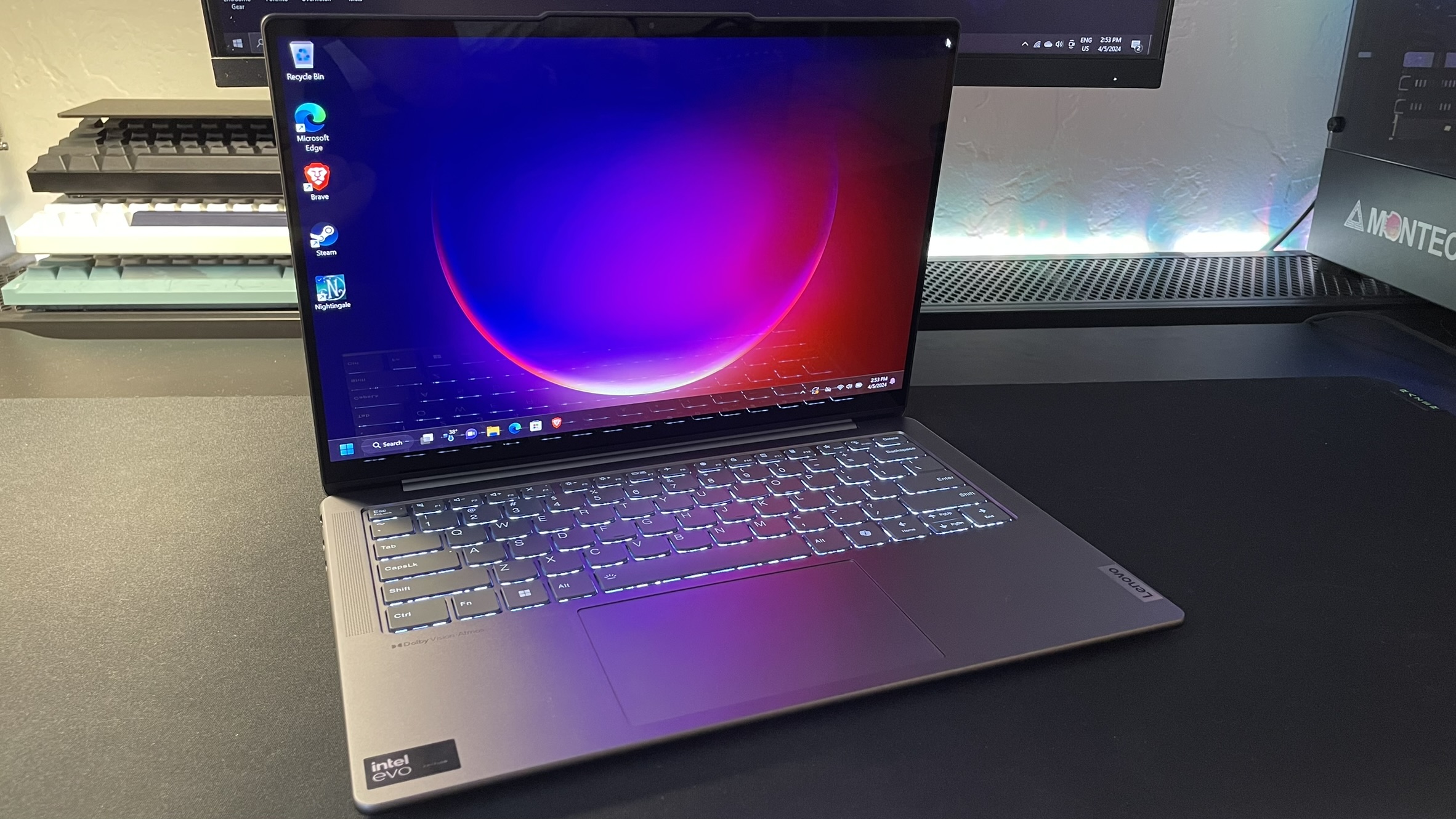
The Lenovo Yoga 7i and Lenovo Slim 7i are both sleek, capable devices in similar price ranges with similar configuration options. However, there’s a major performance gap that gives the Slim 7i Gen 9 a clear edge. It far outperformed the Yoga 7i in virtually all of our tests, especially the display and graphics tests. As a result, the Slim 7i is the better choice for most people, especially those who need to perform tasks like graphic design and video editing.
The Yoga 7i Gen 9 has a lower price, but the $300 difference directly translates into superior performance and a better display on the Slim 7i. So, the Yoga 7i doesn’t offer the same value as the Slim 7i unless its 2-in-1 functionality is a deal breaker.
To see how its price compares to other laptops with a tablet mode, visit our guide to the best 2-in-1 laptops. Alternatively, you might be better served by the Yoga 7i’s more premium counterpart, the Lenovo Yoga 9i, which fared much better in testing.







